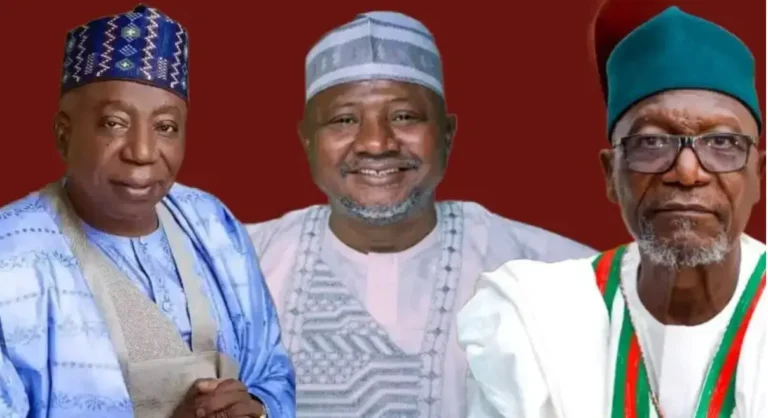The political landscape of Kebbi State witnessed a significant shift as three senators from the Peoples Democratic Party (PDP) announced their defection to the ruling All Progressives Congress (APC). Senators Adamu Aliero (Kebbi Central), Yahaya Abdullahi (Kebbi North), and Garba Maidoki (Kebbi South) formally communicated their decision to the Senate President during plenary, citing a variety of reasons for their departure from the PDP and their subsequent return to the APC. These reasons ranged from disillusionment with the PDP’s internal struggles and lack of direction to a desire to support the developmental agenda of the Tinubu-led administration and address the pressing needs of their constituents.
Senator Aliero, a founding member of the APC, explained that his decision was driven by a deep reflection on the political and socio-economic realities of the nation and his constituency. He expressed concern over the PDP’s internal divisions, lack of clear ideology, and inability to present a compelling vision for the future. These shortcomings, according to Aliero, made it increasingly difficult for him to effectively pursue the reforms and development agenda that his constituents deserved. He contrasted this with the APC’s perceived transformation under its “Renewed Hope” agenda, suggesting that the ruling party offered a more viable platform for him to serve his people and advocate for progressive policies. Aliero emphasized that his decision was not motivated by personal gain but by a genuine desire to contribute to the betterment of his constituency and the nation.
Senator Abdullahi echoed similar sentiments, stating that his return to the APC was driven by a desire to contribute to the developmental strides of both the federal government under President Tinubu and the Kebbi State government under Governor Nasir Idris. Having previously withdrawn from the APC due to political disagreements within the state, Abdullahi highlighted the resolution of these issues under the incumbent governor as a key factor in his decision to rejoin the party. He also emphasized the importance of aligning himself with President Tinubu, suggesting a belief in the potential of the current administration to deliver positive change for the country. Abdullahi’s return to the APC represents a homecoming for him, as he played a significant role in the party’s formation and early successes.
Senator Maidoki attributed his defection to two primary factors: the ongoing internal crisis within the PDP and his belief that the APC’s ideals better aligned with his political aspirations. He expressed confidence that the APC platform would enable him to effectively contribute to the “Renewed Hope” agenda and deliver meaningful benefits to his senatorial district and the nation as a whole. Maidoki also highlighted the security challenges faced by his constituents, noting the positive impact of recent troop deployments in mitigating the threat of banditry, kidnapping, and cattle rustling. His decision to join the APC, therefore, appears to be driven by a combination of national political considerations and a desire to address the specific needs of his constituency.
The defection of these three senators prompted a response from Senate Leader Opeyemi Bamidele, who refuted any suggestions of coercion. He emphasized the experience and independence of the senators, highlighting their established careers and financial stability, which suggested that they were not motivated by personal gain. Bamidele framed their decision as a recognition of the critical moment in Nigeria’s history, urging unity and collaboration across party lines to address the nation’s challenges. He stressed the importance of prioritizing the overriding public interest over partisan politics, suggesting that the senators’ defection was a pragmatic move aimed at contributing to national development.
The defection of these three senators from the PDP to the APC represents a significant political development in Kebbi State. While their individual reasons varied, common themes emerged, including disillusionment with the PDP’s internal struggles, a desire to support the Tinubu administration’s agenda, and a commitment to addressing the specific needs of their constituents. These defections underscore the dynamic nature of Nigerian politics and the ongoing realignments taking place within the political landscape. The long-term impact of these shifts remains to be seen, but they undoubtedly represent a significant development in the political landscape of Kebbi State and potentially the broader national political scene. The APC’s gain in the Senate further solidifies its majority and strengthens its ability to advance its legislative agenda.
The defections also raise questions about the future of the PDP in Kebbi State and its ability to regain lost ground. The loss of three senators represents a significant blow to the party’s presence in the state and its capacity to effectively challenge the ruling APC. While the reasons provided by the senators focused on the internal challenges within the PDP and the perceived opportunities within the APC, the broader political context, including the influence of the ruling party and the potential for political patronage, cannot be ignored. The defections may also trigger further realignments within the state’s political landscape, as other politicians assess their own positions and consider their options in light of the changing power dynamics. The interplay of these factors will shape the political future of Kebbi State and the fortunes of the various political parties vying for influence.














